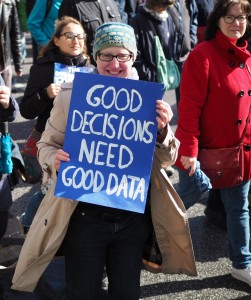Am 24. und 25. September 2019 findet der deutschsprachige Klimakommunikationskongress K3 zum zweiten Mal statt – dieses Mal am Karlsruher Institut für Technologie (KIT).
Tag: climate communication
“The Kids Are All Right – Adults Are the Climate Change Problem” by Max Boykoff
There is an interesting new comment by Prof. Max Boykoff on our partner blog from the Center for Science and Technology Policy Research in Boulder, Colorado/USA. He describes how older adults try to diminish climate engagement promoted by young activists – and calls for more support: “Trust in this next generation of leaders”.
Read the comment here.
New post series: “Explain your Jargon” – Part 1: What is a climate model?
A video series of climate change jargon buster
by Shorouk Elkobros
Climate models, geoengineering, loss and damage – those are some of the confusing terminologies that you’ll stumble upon when reading about climate change and climate politics.
Communicating climate change is a challenge. Most science journalists face difficulty in writing about technical notions that are hard to grasp. In our series ‘Explain your jargon’, we aspire to decode difficult climate terminologies and to present them in an easy, interesting and relatable way. In our first episode we ask: What is a climate model? Continue reading New post series: “Explain your Jargon” – Part 1: What is a climate model?
Six theses for a constructive climate communication

In his column “On the subject” for the Deutsche Klima Konsortium (DKK), Prof. Dr. Michael Brüggemann presents six theses for a constructive climate communication. You can find the complete editorial here (in German only).
Continue reading Six theses for a constructive climate communication
Is German Climate Coverage driven by extreme temperatures? Partly.
by Joana Kollert, Manuel Kreutle, and Michael Brüggemann
Recent weeks have not only brought about record-breaking temperatures, but also a rise in climate coverage, as clearly shown by our Online Media Monitor (OMM) on Climate Change Coverage around the world [1]. But are higher-than-usual temperatures really the main trigger of climate change reporting? We had a closer look at the case of Germany: Continue reading Is German Climate Coverage driven by extreme temperatures? Partly.
Call for manuscripts – new book series “Global Communications”
The first international open access book series in media and journalism studies calls for manuscripts, with Michael Brüggemann as one of the founding editors. Global Communications is a new book series that looks beyond national borders to examine current transformations in public communication, journalism and media. It focuses on the role of communication in the context of global ecological, social, political, economic, and technological challenges in order to help us understand the constantly and rapidly changing media environment.
Editors encourage comparative studies as well as single case studies, especially if they focus on regions other than Western Europe and North America. Until now, those have received most of the scholarly attention. Empirical studies as well as textbooks are welcome. Books should remain concise and not exceed 300 pages but may offer online access to a wealth of additional material documenting the research process and providing access to the data.
Continue reading Call for manuscripts – new book series “Global Communications”
New paper published: From “Knowledge Brokers” to Opinion Makers: How Physical Presence Affected Scientists’ Twitter Use During the COP21 Climate Change Conference
The paper “From “Knowledge Brokers” to Opinion Makers: How Physical Presence Affected Scientists’ Twitter Use During the COP21 Climate Change Conference” was published in the International Journal of Communication. This study investigates the 2015 United Nations Climate Change Conference summit and examines scientists’ social media use by analyzing “digital traces” that scientists left on social media during the summit. Using geolocated tweets, we compare the Twitter use of scientists who attended the conference with those who did not. Combining automated, quantitative, and qualitative content analysis, the study shows how scientists participating in the conference provided live reporting and formed a transnational network. Scientists at the conference and elsewhere engaged in political advocacy, indicating a shift toward a new pattern of hybrid science communication, which includes characteristics that have formerly been attributed to journalism and advocacy.
The full paper is available online.
The paper was published by Stefanie Walter, PhD, Fenja De Silva-Schmidt, M.A., and Prof. Dr. Michael Brüggemann.
One Year of Climate Change on Twitter – One Year of Trump Arousing Attention?
Review of Twitter communication on climate change in 2017: Which events triggered tweets about climate change and to which domains do these tweets link to?
by Ines Lörcher
The analysis of our online media monitor (OMM) reveals that the number of climate change-related tweets has risen compared to 2016. Still – and this year even more – Donald Trump’s statements and action trigger most Twitter communication on climate change. This year’s highest peaks of attention were related to climate political events in the USA. Most tweets were published on 2nd June 2017, one day after US-president Donald Trump declared that the USA will quit Paris climate agreement. Continue reading One Year of Climate Change on Twitter – One Year of Trump Arousing Attention?
Workshop: Redefining the Boundaries of Science and Journalism in the Debate on Climate Change
by Fenja De Silva-Schmidt
As a kick-off for a new research project, the research team of Prof. Michael Brüggemann organized a workshop at the University of Hamburg from June 21 to 23. The team discussed the changing roles of science and politics in times of post-normal science communication with national and international guests.
Wissenschafts-Kommunikation im Trump-o-zän: Wie wir alle das post-faktische Zeitalter verhindern können

Der amtierende US-Präsident ist nicht der einzige, aber einer der lautesten Vertreter einer “postfaktischen” Sichtweise, die sich durch die Leugnung von Verantwortung und einen Rückzug in Subjektivität auszeichnet und in der wissenschaftliche Fakten nach Belieben zur Kenntnis genommen oder ignoriert werden können.
Zu der Frage, wie sich Wissenschaft und Medien auf diese veränderten gesellschaftlichen Rahmenbedingungen einstellen und ein “Trump-o-zän” verhindern können, hat Michael Brüggemann einen Vortrag bei der Jahrestagung 2017 des Deutschen Klima-Konsortiums (DKK) gehalten.
